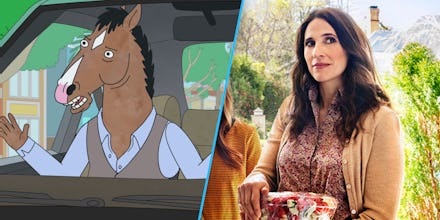'BoJack Horseman' and 'Casual' Depict Mental Health Conditions Honestly and Powerfully

Some TV is just too real. Shows that make you flinch from secondhand embarrassment can be a lot to take in, because they inspire empathy in painful ways. "Too real" is the dark side of relatability. Instead of inspiring awestruck declarations of "that is so me," it has us running for the exit. It reflects the parts of ourselves that are hardest to face.
But for as gut-wrenching as it can be to watch, "too real" is often the most revelatory work on TV. It gets into the crevasses of the human experience and tells deeply affecting stories. Two shows airing on streaming services define what "too real" means on TV: Casual and BoJack Horseman. In committing to the uncomfortable, however, they reveal powerful truths about living with social anxiety and depression, respectively.
(Editor's note: Spoilers ahead for the first two seasons of Casual and BoJack Horseman.)
The second episode of season two of Casual, Hulu's Golden Globe-nominated comedy, is deeply cringe-worthy. In "Trivial Pursuit," Valerie (Michaela Watkins) tries to reconnect with a friend, Karen (Pell James). Karen invites her to come out to a bar, but Valerie shows up early. She sits at the bar waiting, then realizes from an Instagram post that Karen's already there at a friend's birthday dinner.
Valerie joins the dinner, unsure of how to insert herself into an unfamiliar situation. "I saw your post on Instagram," she says, instantly regretting it. What follows is a comedy of errors that steps over the line from silly mishaps and actually becomes painful to watch. Her inability to conduct herself socially is stultifying.
Every moment of the scene is agonizing, from Valerie's ex-husband showing up to accidentally getting into an argument about child-rearing with the woman celebrating her birthday. She misses every social cue not because she doesn't want to see them, but just doesn't understand.
This isn't new for Valerie. She confesses a crippling inability to make new friends in the season's third episode, and expresses confusion with even the most basic social interactions (like sending a text) numerous times throughout the series. She's a textbook case of social anxiety disorder.
Casual shares much in common with another show on a streaming network: Netflix's BoJack Horseman, which returns for its third season Friday. The show, Netflix's best series, is an animated tale about a washed-up sitcom actor seeking relevance years after his prime. At its heart, however, BoJack Horseman is an affecting story about a man fighting against himself. Many have hailed the show for getting depression right, all while still remaining funny.
At the end of BoJack's first season, the equine protagonist (Will Arnett) shows up at his friend Diane's (Alison Brie) book discussion panel. BoJack asks a question, speaking evenly at first, but quickly spiraling into a hole of self-hate. "It's not too late for me, is it?" he asks her, increasingly desperate. "I need you to tell me it's not too late. I need you to tell me that I'm a good person."
The next season goes even further. BoJack makes bad decisions for both his career and personal life. He runs away from his problems in Los Angeles, but then, while visiting a friend in New Mexico, he puts himself in a compromising situation with his friend's daughter. He's trapped in a destructive cycle, doomed to repeat worst mistakes.
This isn't a show like House or Rescue Me, where the antiheroic main character's bad-boy tendencies are part of the fun of the show. BoJack is a guy who wants to be good, but keeps defeating himself along the way.
Is it difficult to watch at times? Sure. Is it important, compelling, instructive television? Absolutely.
Like Casual just gets how social anxiety feels, BoJack naturally understands depression. The mental illnesses are built into the shows' DNA. They not only put forth an relatable and detailed portrayal of each, they present them in a way where even viewers like me, who don't experience depression or social anxiety, can comprehend and empathize with the symptoms.
BoJack Horseman and Casual offer more than just entertainment; they offer the chance to connect. That's part and parcel of exactly how important representation is, especially when it comes to mental health.
Yes, it's incredibly vital that people who do live with depression and anxiety get to see themselves depicted in media. But viewers living without those disorders also glean much from these shows. They learn how to better communicate with friends, family and loved ones who do live with anxiety and depression. That's powerful, and it's demonstrates the importance of popular art. At its best, pop culture is more than escapism or diversion. It's unifying.
Read more: